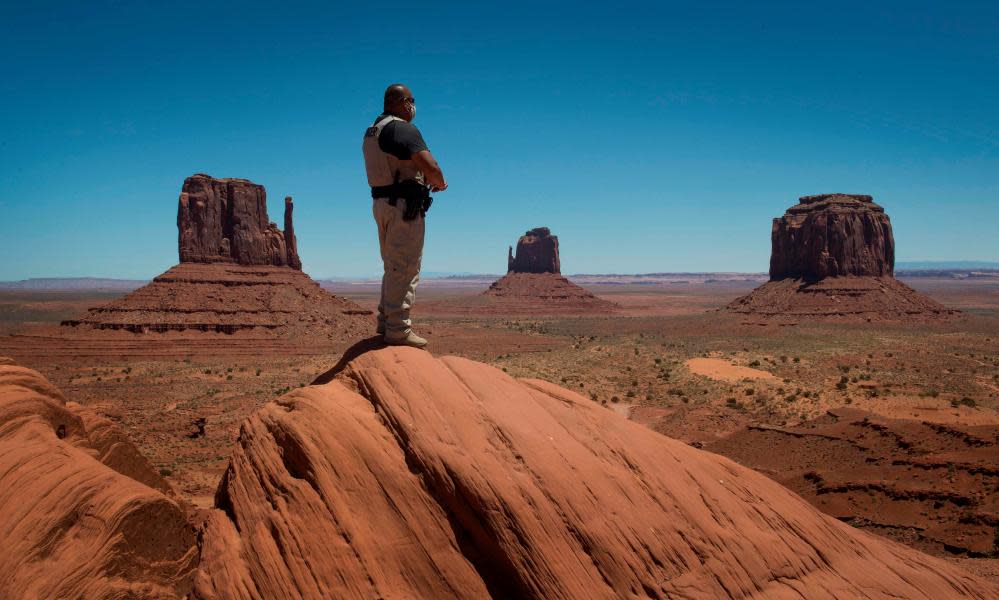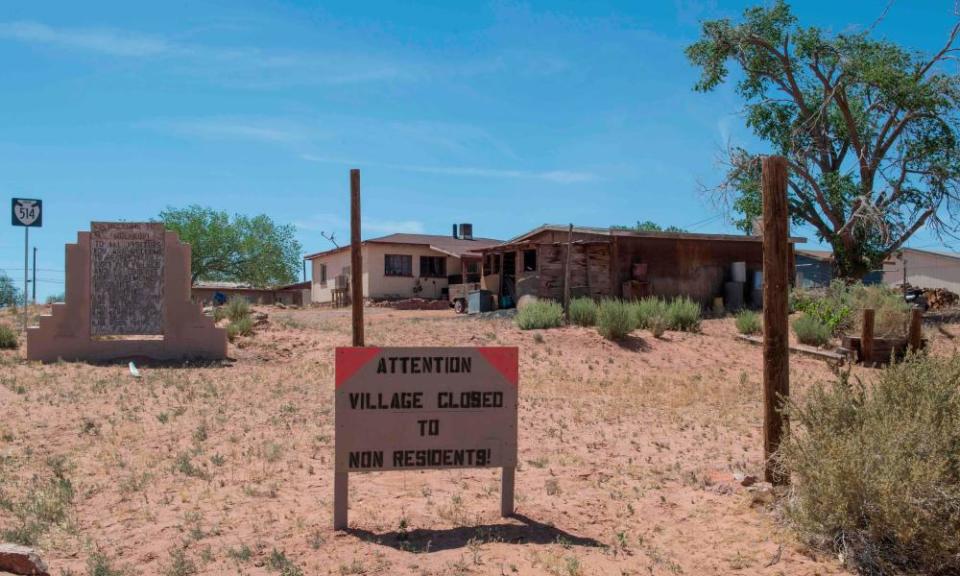Navajo nation reinstates lockdown as Covid-19 cases surge near reservation

The Navajo nation has been forced to reinstate lockdowns to shield its people from major coronavirus outbreaks outside the reservation, especially in Arizona, where cases are surging.
The Navajo, the second largest Native American tribe, has been severely affected by the pandemic with 322 confirmed deaths as of Wednesday – more than 16 states including Kansas, Nebraska and South Dakota. The death toll equates to a death rate of 177 per 100,000, higher than any single US state.
Related: Why Native Americans took Covid-19 seriously: 'It's our reality'
New cases and deaths have been declining over the past couple of weeks, thanks to public health measures such as widespread testing, which led to travel restrictions including a weekend curfew being lifted at the start of June.
However, tribal leaders fear the rapid rise in cases in neighboring states, especially Arizona but also Utah, threatens to undo their hard-won progress in containing the spread.
Complicating the issue is the fact that the Navajo nation is a food desert with only 13 grocery stores, and a third of residents do not have running water, which forces people to travel to neighboring states for basic items.
Navajo nation president Jonathan Nez said at a virtual town hall earlier this week: “Arizona relaxed its preventive measures, and the number of cases and hospitalizations continue to drastically increase. We cannot put our nation in the same situation. We will continue to rely on science and data as we fight this pandemic.”
A 57-hour lockdown has been ordered for the next two weekends, with only essential travel permitted. Face masks must be worn in all public spaces.

“A second surge, a worse surge, may put a lot of pressure back on our healthcare system and our healthcare workers,” said Nez.
During its peak, the Navajo nation sent the sickest patients from the reservation to hospitals equipped with intensive care units in neighbouring states. But this may not be possible in future, given that more than 80% of Arizona’s adult ICU beds are full – almost 40% with Covid-19 patients.
As Nez reinstates public health measures to avoid a new surge, Doug Ducey, Arizona’s Republican governor, has stood by his decision to reopen for business.
The state began easing restrictions on businesses in early May and lifted its statewide lockdown order on 15 May, even though there was no consistent downward trend and rapid testing is not widely available.
About 25% of the population on the reservation have been tested, one of the highest rates anywhere. In comparison, Arizona has tested 5% of its population, and nationwide the figure stands at 8%, according to the Covid Tracking Project.
“It would be preposterous to think that people going out aren’t increasing the positive cases,” Dr Murtaza Akhter of the University of Arizona College of Medicine told Cronkite News. “One of my concerns is whether people are ever going to take public health emergencies seriously.”
Ducey’s critics have accused him of making coronavirus policy choices in response to Donald Trump’s visits to Arizona, with little regard for the science and public health data.
Amid growing pressure from city officials and frontline health workers, Ducey on Wednesday said he would allow local mayors to mandate wearing masks in public, but refused to implement a statewide order.
Coronavirus cases are increasing in 20 states including California, Florida, Alaska and Idaho. In response, tribal leaders across the US continue to enforce strict lockdown measures even as governors ease public health controls in favor of reopening for business.
In Montana, which reopened to tourists on 1 June, the impact of coronavirus remains relatively low, with 630 confirmed cases including 20 deaths, but numbers are on the rise. The state’s eight tribes, including the Crow and Blackfeet nations, have not relaxed shutdowns or stay-at-home orders, partly in order to protect their vulnerable elders, who are revered as guardians of Native culture and heritage.

